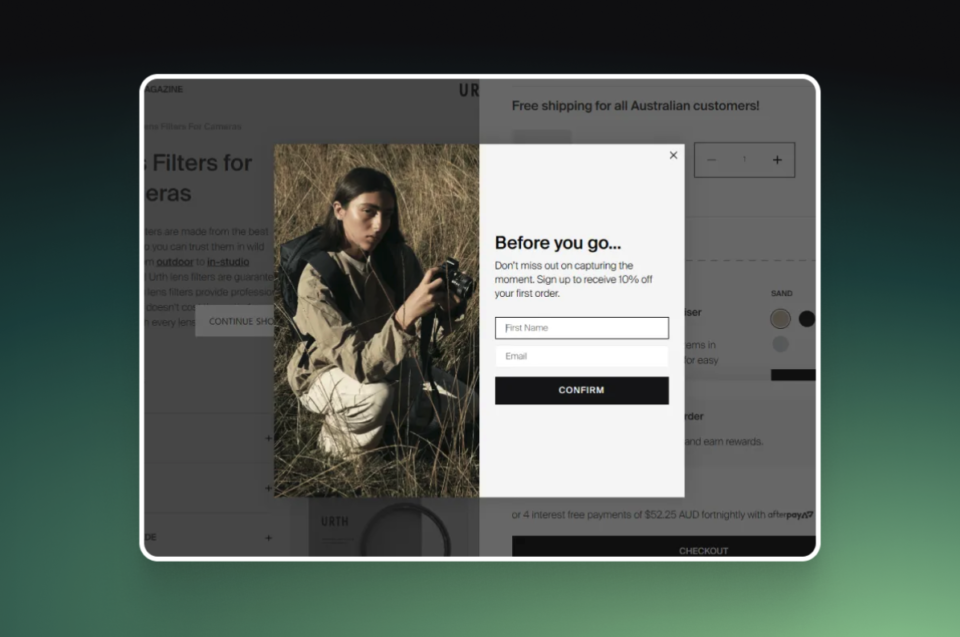Cart abandonment is one of ecommerce’s most frustrating realities and it’s costing you real money.
On average, nearly 70% of online shopping carts are abandoned. That’s over two-thirds of purchase intent vanishing before checkout. For a brand doing $1M in online sales, that’s potentially another $2M+ left on the table.
The good news? You can claw that revenue back. But forget the fluffy tips, these are the strategies that actually move the needle, especially for Shopify brands ready to scale.
Why Are Customers Abandoning Their Carts?
Let’s get to the root. According to Baymard Institute, here’s why shoppers bounce:
- 48% Unexpected costs (shipping, taxes, fees)
- 26% Forced account creation
- 25% Concerns about payment security
- 23% Slow delivery times
- 22% Complicated checkout processes
- 13% Limited payment options
This is not just about “nudging” a sale. It’s about removing every barrier to buying, fast, simple, and trust-first. Here's how.
1. Eliminate Friction at Checkout
The best checkout experience is invisible. That means:
- Enable Shop Pay – We've seen this increase conversion rates by up to 40%
- Ditch the cart page – Go straight to checkout. Draw-style carts with slide-in drawers reduce clicks and boost urgency
- Use a progress bar – A visual progress slider at checkout improves completion rates by giving users a clear path forward
- Accelerated payment options – Think Apple Pay, Google Pay, PayPal. These reduce drop-off by up to 15%, simply by speeding up the process
Pro tip: Every extra step = a chance to lose the sale.

2. Deploy Abandoned Cart Emails That Actually Convert
Not all cart recovery emails are equal. The top-performing flows:
- Trigger within 30 minutes of abandonment
- Include dynamic cart contents
- Offer an incentive (e.g. “You saved $24” – always use the higher value: dollar vs percentage)
- Use urgency: "Only 3 left in stock" or "Expires in 24 hours"
Platforms like Klaviyo make this dead simple, and automated.

3. Make Payment Flexible and Obvious
Customers want choice, and speed.
Offer all major payment methods:
- Shop Pay
- Apple Pay
- Google Pay
- PayPal
- AfterPay and BNPL options
Display these logos early in the checkout process, not just at the final step. It builds trust and shows flexibility upfront.
4. Cross-Sells, Upsells, and AOV Boosters
Cart abandonment isn’t just about saving sales, it’s a moment to increase AOV (average order value).
- Pre-checkout upsells: Think accessories or bundle options that appear in the cart drawer
- Post-purchase offers: Trigger add-ons after payment without interrupting the checkout flow
- Leverage Shopify’s Cart Transform Function API for maximum control or use Shopify apps like Rebuy to roll these out quickly
5. Leverage First-Party Data for Personalisation
Personalised experiences convert better. Period.
- Show returning users their saved cart or previous purchases
- Serve personalised recommendations via email and retargeting
- Use behavior-triggered discounts based on browsing or cart value
We’ve seen brands increase recovery by over 20% just by personalising discount emails with past purchase data.
6. Retarget with Purpose
Cart abandonment doesn’t mean no interest, it just means “not now.”
Use Google, Meta, and TikTok ads to retarget cart abandoners with:
- Dynamic product carousels
- Low stock messages
- Countdown timers or time-limited offers
Retargeted shoppers are 70% more likely to convert than cold traffic.

7. Exit-Intent Popups That Add Real Value
Poorly timed popups kill UX. Smart ones save the sale.
Trigger popups only when a user signals exit intent, offering:
- A discount (based on cart value)
- Free shipping threshold (“Spend $12 more for free shipping”)
- Bundle offer (“Add X and save $15”)
Test message types and only show them once per session.
8. Build Trust Early and Often
Don’t wait until the payment step to prove you're legit.
- Offer clear returns (e.g. “30-Day Free Returns”)
- Use real reviews with UGC
- Make shipping timelines visible on product pages
Transparency reduces hesitation, especially for new customers.
9. Real-Time Support = Real-Time Sales
Sometimes, a single question is all that’s in the way.
Add live chat or AI chatbots during high-intent moments (like cart and checkout). Offer:
- Instant answers to shipping questions
- Product suggestions
- Quick reassurances (“Yes, it’ll arrive by Friday”)
Shoppers who engage with chat can convert up to 4x higher.
10. Push and SMS Reminders That Nudge Without Annoying
These channels have insane open rates:
- SMS: ~98%
- Push notifications: ~80%
Use them strategically:
- Short, personal messages
- Highlight discounts or stock limits
- Offer easy tap-to-complete checkout
Make sure opt-ins are clear and value-based (e.g. “Get 10% off via SMS”).
The Bottom Line
Reducing cart abandonment isn’t about gimmicks, it’s about creating a seamless, trust-filled journey from product page to purchase confirmation.
At Process Creative, we don’t just tick boxes. We partner with ambitious Shopify brands to design and optimise experiences that convert, because we know what actually works.
Ready to stop bleeding revenue? Let’s talk.






